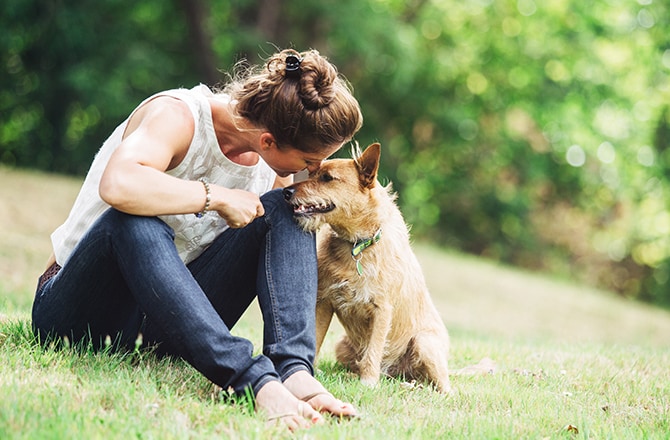If you own a pup who is fond of digging, you likely have at least a few holes in your yard. This pet behavior can be quite irritating, but know that dog digging is not ill-intentioned. There can be many reasons why your dog digs holes in your lawn, from instinctual behavior to simply being bored. Although dog digging is a common pet behavior that all breeds share, the motive behind this practice isn’t that straightforward.
It’s helpful to understand where these habits come from so you can avoid frustration and possibly prevent future craters from showing up in your lawn. Get tips for how to stop dogs from digging holes.
Most commonly, dogs will dig a hole in the yard to create a cooler space in the dirt for them to get comfortable in. This is especially true on a warm summer day while your dog is playing outside. If you notice holes located in a shady area, it is likely that your pup was looking for a place to cool down. While humans have the other side of the pillow, your dog will opt for the other side of the grass. In cases like this, you can offer your dog some relief from the heat by setting up a kiddie pool with water or by setting up an elevated cooling bed in a shady spot.
Another reason dogs will dig holes is to keep themselves entertained. Sometimes, a dog will dig a hole, hide a treat or small toy inside to save for later, cover the hole up with dirt using his nose, and repeat the process all over again. This dog behavior is said to have come from when our dogs were wilder creatures, and would use this method as a form of survival by protecting their food from others. This dog psychology has manifested itself in the modern domestic dog, who may even be so inclined to dig and bury what you consider to be valuable, like car keys or a wallet, in a genuine effort to store these items in a safe place.
Dog’s will often fall victim to their urge to hunt and chase small animals, and won’t let an animal who burrows underground prevent them from catching their prey. “It’s an instinctual [dog] behavior. Their incredible sense of smell tells them that these animals are in the dirt, and what better way to fulfill that instinctual drive than to go after them,” says Dr. Jess Trimble, DMV, a veterinarian from Fuzzy Pet Health in San Francisco.
Sarah Wooten, a small animal veterinarian at Sheep Draw Veterinary Hospital in Greeley, Colorado, says that certain breeds are more prone to digging than others. “Terrier breeds, Dachshunds, Beagles, and Hounds all love to dig because their ancestors were used for hunting,” she says. “[If] you’ve got a Terrier breed and a yard, you’re likely to have holes all over the place. In fact, your yard may look a lot like Swiss cheese.”
Some pups will even dig just because they are bored or anxious. Dr. Trimble explains that one reason for dog digging is that pups need something to do to burn off excess energy and obtain mental stimulation. “These dogs that spend a lot of time in the backyard can become bored, with too much energy, and digging is the perfect way to stimulate the brain as well as to get exercise,” says Dr. Trimble.
If you suspect that your pup is digging to rid himself of anxious energy or pure boredom, Dr. Trimble recommends providing your pup with lots of exercise and mental stimulation outside of your backyard to decrease the unwanted behavior. Try hiding dog toys and dog treats around the house and yard as a less destructive alternative. If you don’t mind just having one hole in your yard, Dr. Wooten explains that you can designate a special spot for your dog to dig in and reward your pup when he digs in just that one area. Make it extra fun by hiding his favorite toys and treats in his hole for him to excavate later.
If your pet is prone to engage in dog digging behavior, make sure to watch out for upset stomachs, intestinal parasites, or ingestion of toxic plants, which can all occur if your dog happens to consume dirt. Some tips to avoid future health problems: Have your pet’s fecal samples checked yearly for parasites, rid your yard of poisonous plants (Dr. Trimble recommends referencing the ASPCA for insight), and inspect the digging sites to see if broken glass or other unsafe objects lurk in his favorite spots. Also, it would be wise to clean your digger’s paws to prevent foot or nail infections.
If you notice a few holes in your lawn one day from dog digging, don’t get upset, and remember why your dog is displaying this behavior. Err on the side of caution by checking up on his health often and clearing your backyard of potentially harmful objects.
Share:










